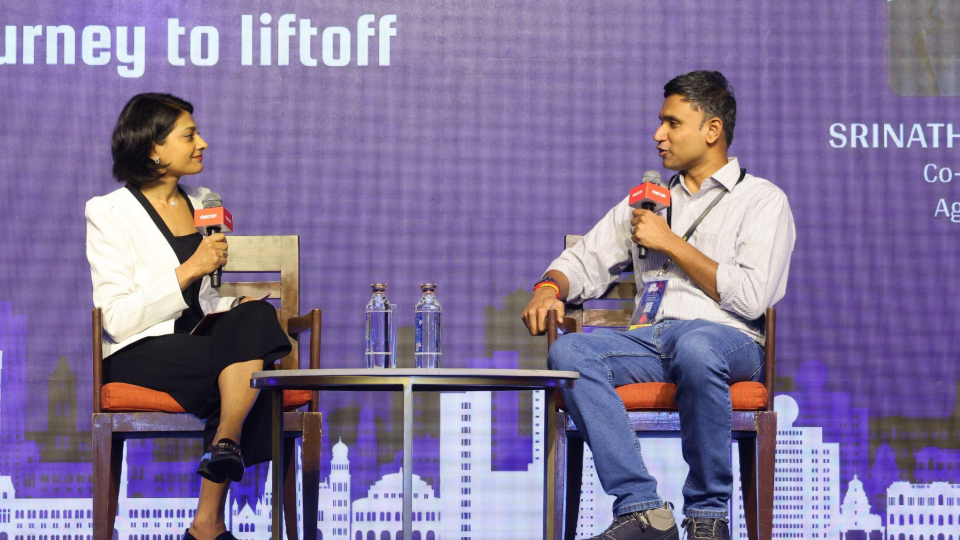Startup
Space is not an exclusive domain for the wealthy; it’s crucial to demystify this myth: Agnikul CEO

The poster boy of India’s space industry, Srinath Ravichandran, Co-founder and CEO of Agnikul Cosmos, believes it’s crucial to demystify the perception that space is an exclusive domain for boys and the wealthy.
“All the big startup stories in the US for space still seem to be driven by billionaires or people who were already billionaires or close to it before they started. Take Elon Musk or Jeff Bezos, for example. Here (in India), none of us had that kind of money to start,” Ravichandran told a packed audience during a fireside chat at Tamil Nadu Story 2024, YourStory’s flagship event that strives to empower the startups and homegrown brands of Tamil Nadu.
However, the perception that space is for the rich is gradually changing in India, asserted Ravichandran. It fascinates many people, particularly young people who are “super excited” about it, he added. This excitement reminds him of why he got into the field in the first place.
This is the reason why Ravichandran tries to spend a lot of time with anyone who wants to do something in space.
“I grew up as an aerospace enthusiast … Being able to actually attempt building a real rocket that can go to space from Chennai is a dream come true,” said a jubilant Ravichandran.
Enabling the ecosytem
Chennai-based Agnikul Cosmos, a startup incubated at IIT-Madras, was founded in 2017 by Ravichandran and Moin SPM.
After four failed attempts, the spacetech startup made history on May 30 this year, with a triumphant sub-orbital test flight of its launch vehicle, Agnibaan SOrTeD (suborbital technological demonstrator), powered by the Agnilet engine—the world’s first single-piece 3D-printed semi-cryogenic rocket engine.
“It is still surreal. I sometimes play the video at night, and it still doesn’t feel like it actually happened, even though it did,” shared the Agnikul CEO, who started his career as a Wall Street trader but soon realised he was an engineer at heart.
Ravichandran stated that, since May 30, at least 10-15 people have reached out to him saying they want to start something in space.
“In a small way, we are enabling the ecosystem, so that is a great feeling,” he said.
India’s growing space sector
The space sector, which is opening up in the country, will branch off into two streams, pointed out Ravichandran.
He explained that the ISRO (Indian Space Research Organisation) community will focus on areas where there are no business models–such as the first human mission to orbit from India and the Indian Orbital Space Station, officially called ‘Bharatiya Antariksha Station’. And for areas that ISRO has already addressed and where business opportunities exist, it’s up to startups to take them forward, the Agnikul chief added.
Apart from Agnikul, Skyroot Aerospace, Pixxel, Dhruva Space, and Bellatrix Aerospace are some of the other startups driving innovation in both space launches and downstream technologies.
“How should a successful private launch company in India be? That is still being figured out, or rather, we are all in the process of figuring it out,” said Ravichandran.
Agnikul is betting on 3D-printed rocket engines for affordable space launches. Explaining the reasoning behind choosing this approach, Ravichandran said it was because people are waiting for too long to get to orbit. To reduce launch times, it had to make rockets quickly; one focus area is to expedite the production of rocket engines, which take the most time, he added.
“Our team has come up with a technology where the entirety of the rocket engine is printed in a single shot without any human interference. In a way, it is like automated engine making,” he said.
3D printing enables the startup to iterate hardware as quickly as software.
The Agnikul chief said that anyone with a payload should consider three things: mass (which determines the cost), destination, and origin.
Ravichandran pointed out that the goal is to develop a framework wherein, with just these three inputs, a launch can be scheduled within two weeks. 3D printing, mobile launch pads, and modern avionics are all steps toward solving this challenge. That’s how Agnikul is working to make space more accessible, he said.
The startup will also focus on reusability going forward, Ravichandran said, adding, “Our vehicles are capable of being reused … Every launch from now on will have a secondary objective of testing technology related to recovery.”
According to the Agnikul CEO, the spacetech firm is actively working on having a multi-mission testing plan, so that, within the next 10 missions, the startup will be fully sustainable from a vehicle standpoint.
“The deorbiting protocol is something that we want to follow; our vehicles will not be in orbit, if they don’t have to be in orbit,” he added.
Space agencies worldwide aim to use reusable launch vehicles for rockets to save millions of dollars. Private space tech companies such as Musk-led SpaceX and Bezos-led Blue Origin are developing fully reusable launch vehicles.
“Do your job and come back,” Ravichandran remarked, adding, “It’s a vehicle; it should not just go and stay where it goes.”
Startup
Juspay cuts losses by 7.7% as revenue surges 49.6% in FY24

Payments startup Juspay Technologies saw its losses narrowing in FY24 as revenue growth outpaced expenditure. It narrowed its total loss for the period to Rs 97.54 crore, down 7.76% from Rs 105.75 crore in FY23.
According to the consolidated financial statements accessed from the Registrar of Companies, the SoftBank-backed fintech firm’s revenue from operations surged 49.64% to Rs 319.32 crore, up from Rs 213.39 crore in FY23.
Juspay’s primary revenue source—payment platform integration fees—brought in Rs 286.52 crore. Additional operating revenue from services like product implementation and support added Rs 32.80 crore.
Total expenses rose by 29.52% to Rs 443.74 crore in FY24, compared to Rs 342.59 crore in the previous year. This increase was largely driven by employee benefit expenses, which saw a 41.73% jump to Rs 303.36 crore, while other expenses increased slightly over 3.56% to Rs 123.76 crore.
Juspay, founded in 2012 by Vimal Kumar and Ramanathan RV in Bengaluru, specialises in developing payment orchestration solutions that act as a technology layer over traditional payment gateways.
The Accel-backed startup has also developed Namma Yatri, a mobility app focusing on ride-hailing services, leveraging Juspay’s strengths in payments and open-source protocols. Namma Yatri is built on the Beckn Protocol and aligns with the Open Network for Digital Commerce (ONDC), aiming to provide low-cost ride-hailing options and open access to digital mobility services.
Recently, Juspay decided to spin off Namma Yatri as an independent entity to attract separate investors and scale further. In February, the company said it acquired LotusPay in an all-cash deal to strengthen its offerings to the BFSI segment and merchants.
LotusPay, founded in 2016, pioneered NACH Debit technology with cloud-based software for merchants and banks. Using NPCI’s NACH Debit, it facilitates recurring payments for loans, insurance, and subscriptions.
Startup
Flipkart selects five startups for third cohort of Flipkart Leap Innovation Network

has selected five innovative startups for the third cohort of its flagship startup accelerator programme, Flipkart Leap Innovation Network (FLIN).
The cohort is introducing startups that are driving advancements across GenAI, omnichannel, analytics, and video commerce, the company said in a statement.
The selected startups— Intelligence Node, Invenzo Labs, StoryBrain, Phyllo, and D-ID— are set to run pilot programs with Flipkart to develop solutions.
“The selected startups get access to mentorship, resources, and the opportunity to execute pilot projects within the Flipkart ecosystem, scaling their solutions to meet the demands of India’s digital economy and e-commerce growth,” the company said.
Since its launch in 2022, the accelerator programme aims to accelerate the growth of the startup ecosystem in India, driving collaboration, and championing cutting-edge retail innovations.
“Through the FLIN programme, Flipkart continues to expand its role as a catalyst for innovation within India’s startup ecosystem, providing a collaborative platform for startups to test, refine, and deploy solutions that can shape the future of e-commerce in India,” said Naren Ravula, Vice President and Head – Product Strategy and Flipkart Labs.
The programme is designed to engage with startups through commercial partnerships in Flipkart’s areas of interest. Successful startups get the opportunity to scale up to a business partnership.
Over 20 startups from the initial two cohorts have concluded pilots working closely with the Flipkart Product and Engineering teams.
The company added that four startups from the previous cohort— Anagog, Speedsize, Sangti, and Vtion— have recently concluded successful pilot projects with Flipkart.
Startup
Thesys secures $4M funding led by Together Fund

AI startup Thesys bags $4 million funding in a round led by Together Fund. The round also saw participation from 8VC, the company said in a statement.
The startup will use the funding to bridge the gap of user experience with AI agents. As a visual collaboration tool, the company will also provide a platform that will enable businesses to ideate, visualise, and ship intelligent experiences at scale.
“The way we engage with technology is changing faster than ever. Static interfaces simply don’t meet the demands of today’s AI-capabilities…At Thesys, we’re building tools that make it possible for businesses to adapt and thrive in this new era,” said Parikshit Deshmukh, Co-founder, Thesys.
This evolution is about unlocking the full potential of AI-driven interactions and delivering unparalleled user experiences, he added.
“The future of AI relies as much on intuitive, adaptive interfaces as it does on backend capabilities. Thesys’ vision for Generative UI aligns perfectly with Together Fund’s commitment to enabling founders who are redefining the user experience,” said Manav Garg, Co-founder and managing partner of Together Fund.
“By empowering teams to create real-time, personalized interactions, Thesys is setting a new standard for AI-driven interfaces. We’re excited to support their journey in transforming the role of design and development tools for the next generation of AI applications,” he added.
The company, founded by Rabi Shanker Guha and Parikshit Deshmukh this year, emerged from the understanding of the need to provide support in the shift towards AI-driven interfaces, it said.
“Thesys envisions a future where all interfaces dynamically adjust to each user’s behavior, preferences, and needs—driven by what the company calls “Generative UI”. Unlike traditional static interfaces that rely on predefined paths, Generative UI uses AI to create unique, adaptive user interfaces on-the-fly, allowing businesses to provide truly personalized digital experiences,” the company added.
The company plans to launch a UI SDK that is set to enable developers to seamlessly integrate Generative UI into their applications. Additionally, post its closed beta launch, the company plans a general availability (GA) with its product within the next quarter positioning itself as the go-to product toolkit for businesses looking to stay ahead in the AI revolution.
“Thesys is pioneering a transformative shift in UI design workflows by integrating AI-driven adaptability… Their Generative UI approach aligns with our commitment to investing in technologies that drive innovation in user experiences,” said Bhaskar Ghosh, partner at 8VC.
-

 Startup Stories1 year ago
Startup Stories1 year agoWhy Millennials, GenZs Are Riding The Investment Tech Wave In India
-

 Startup Stories1 year ago
Startup Stories1 year agoStartups That Caught Our Eyes In September 2023
-

 Startup Stories1 year ago
Startup Stories1 year agoHow Raaho Is Using Tech To Transform India’s Fragmented Commercial Trucking
-

 Startup Stories12 months ago
Startup Stories12 months agoMeet The 10 Indian Startup Gems In The Indian Jewellery Industry’s Crown
-

 Crptocurrency8 months ago
Crptocurrency8 months agoLither is Making Crypto Safe, Fun, and Profitable for Everyone!
-

 Startup Stories1 year ago
Startup Stories1 year agoHow Volt Money Is Unlocking The Value Of Mutual Funds With Secured Lending
-

 Startup Stories1 year ago
Startup Stories1 year agoWhy Moscow-Based Kladana Considers Indian SME Sector As The Next Big Market For Cloud Computing
-

 E-commerce1 year ago
E-commerce1 year agoTop Online Couponing Trends To Watch Out For In 2016




